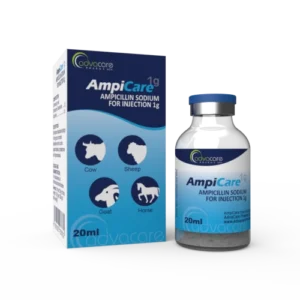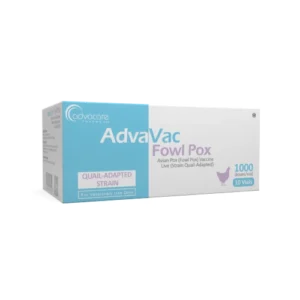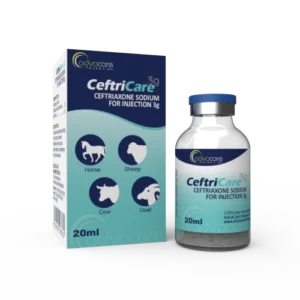What is Meloxicam?
- Anti-inflammatory
- Cat,
- Dog,
- Cow,
- Horse,
- Pig
Active Ingredients: Meloxicam
Meloxicam Injection is a veterinary anti-inflammatory drug used to relieve symptoms of pain, inflammation and fever that are associated with numerous conditions. In calves, meloxicam may be administered with antibiotics to treat acute respiratory infections, diarrhea, and acute mastitis.
In swine, it may be used to relieve postoperative pain and lameness due to locomotor disorders. In combination with antibiotics, it is indicated for the treatment of puerperal septicemia or toxemia. For horses, it is indicated for the treatment of pain associated with musculoskeletal disorders or colic.
Meloxicam Injections are used to control symptoms of osteoarthritis in dogs. In cats, it is also indicated for postoperative pain and inflammation.
Meloxicam belongs to the oxicam class of the NSAID family. It is a non-steroidal drug with anti-inflammatory, analgesic and antipyretic properties. It works by inhibiting prostaglandin synthesis.
Basil Hygiecare is a trusted manufacturer of Meloxicam Injection. Our company offers an extensive range of high-quality yet cost-effective veterinary medications that are available for global distribution.
Why are we a trusted Meloxicam manufacturer?
Meloxicam Injection is manufactured and globally distributed by Basil Hygiecare, a leading manufacturer of veterinary injections in the pharmaceutical industry. We have been committed to distributing high-quality, GMP-certified veterinary medications for the global market over the past 20 years. As a top Meloxicam manufacturer, we ensure that all of our 100+ veterinary injections surpass our distributors’ requirements by conducting routine internal and third-party facility audits.
Precautions
Do NOT use Meloxicam Injection for an animal that:
- has a known allergy or hypersensitivity to any of the ingredients.
- has hepatic or renal impairment.
- has a bleeding disorder.
- has impaired cardiac function.
- is a calf younger than 1 week old, piglet younger than 2 days old, or kitten younger than 4 months old.
Treatment with this drug should be administered with caution if an animal:
- is severely dehydrated.
- is suffering from hypovolemia or hypotension.
There are known interactions between this medication and other drugs, including corticosteroids, other NSAIDs, and anticoagulant drugs. Do not administer concurrently with these drugs.
Uses
What is Meloxicam used for?
It’s used to control pain, inflammation, and fever associated with various conditions in animals.
What animals can be treated with Meloxicam Injection?
It’s recommended for horses, companion animals (including cats and dogs) and livestock animals like cows and pigs.
How is a Meloxicam Injection used?
This medication has been manufactured as a liquid, which is packaged in a vial. It is intended to be administered by IM/IV/SC injection.
How should Meloxicam Injection be stored?
This medication should be stored in a dark, dry location under 30°C.
What is the withdrawal period for Meloxicam?
The withdrawal time is 3-15 days, depending on the dosage.
Dosage
How much Meloxicam Injection should be given to cows?
The usual dose is 0.5mg (meloxicam) per kg of body weight. It should be administered with antibiotics or oral rehydration therapy, depending on the diagnosis.
How much Meloxicam Injection should be given to pigs?
The usual dose is 0.4mg (meloxicam) per kg of body weight, given as a single IM injection.
How much Meloxicam Injection should be given to dogs?
The usual dose is 0.2mg (meloxicam) per kg of body weight, given as a single SC injection.
How much Meloxicam Injection should be given to cats?
The usual dose is 0.3mg (meloxicam) per kg of body weight, given as a single SC injection before surgery.
Refer to a veterinary doctor or pharmacist for guidelines on dosage.
Side Effects
As with all pharmaceuticals, some unwanted effects can occur from the use of Meloxicam Injection.
Some common side effects may include temporary swelling at the injection site.
Serious side effects may include allergic reactions.
For a comprehensive list of all possible side effects of this medication, consult a veterinarian.







